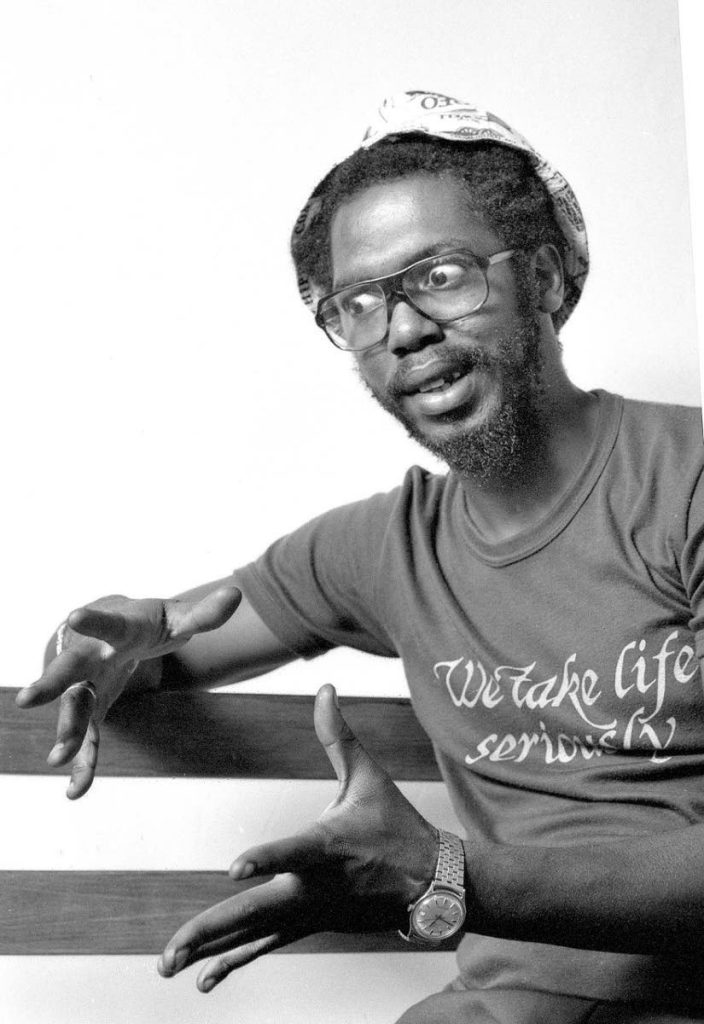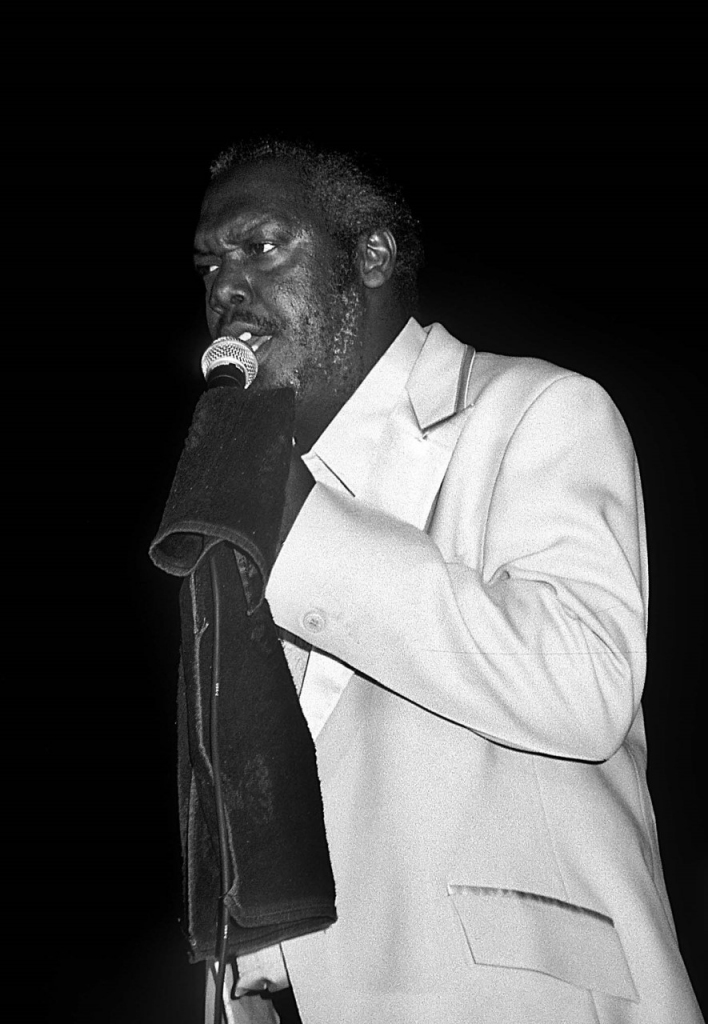Sprangalang hailed as master of all arts

FILMMAKER and founder of Banyan Ltd Christopher Laird says his long-time colleague and friend Dennis “Sprangalang” Hall should be classed among the best of kaiso masters.
Hall, 71, died on Friday, two days after his birthday, and just six months after his older brother, playwright Tony Hall, died from a heart attack at his home in Tobago. He was also 71.
Hall (Dennis), who spent nearly two months in hospital last year, was again warded at the Eric Williams Medical Sciences Complex, Mt Hope, since September 25, after he suffered a stroke. He is survived by his wife, 2019 Calypso Queen Natasha “Sexy Susie” Nurse and his daughter.
Laird told Sunday Newsday Hall was “the most original and creative manipulator of our language in the service of humour as social commentary.
“In that, he should be classed alongside the kaiso masters of that calling: (Mighty) Spoiler and Shadow,” Laird said.
“He could be relied on to present an unexpected perspective for entertainment and revelation on any topic. Like those masters, he cannot be replaced, and we have to value the years we had with him to experience his unique genius.”
Hall and Laird, together with several others, who later became prominent figures in local performing arts, met during a University of The West Indies summer school programme in 1974, before the advent of TT Television Workshop, which later became Banyan Ltd.
Laird, a founding member, invited Hall to Gayelle, a TV series produced by Banyan.
Hall eventually became known as Draxi and Cultural Sprangalang and went on to contribute to over 300 episodes. He also performed a Late Night Lime series, consisting of 14 parts, in 1990.
As a comedian, Hall was considered by many to be frank and unapologetic during his routines, fearlessly taking on hot topics of the day.
He was also described by his colleagues as particularly versatile, given his accomplishments as a TV, film and on stage actor. He was also well known as an MC, a composer and singer, and he appeared in a number of television and radio commercials.
On stage, he sported an iconic scruffy beard and loose button-up t-shirt.
Hall presented clever social commentaries about TT culture, usually featuring an exaggerated Trinidad dialect, which he would often amplify with a bright, wide gaze directed at the audience. This image, some say, was in stark irony to his intelligence and upbringing, especially coming from a middle-class family. His father was in fact vice-principal at Hall’s alma mater, Naparima College.
Among his most prominent dramatic roles viewed internationally were in 2003 Caribbean-Canadian sitcom, Lord Have Mercy and A Winter Tale, a 2007 award-winning film.
He also co-starred in the 2010 play, A Man in the Bedroom, along with his friend and long-time fellow stage performer Errol Fabien.
Hall was honoured by the National Action Cultural Committee at the 2012 Top 20 Stars of Gold Awards, and was also made an honorary member of the Trinbago Unified Calypsonian Organisation (TUCO).
Hall was TUCO president in the 1990s, succeeding the organisation’s first president Winston “Gypsy” Peters.
Peters said he was a wonderful human and important part of the culture and history of TT. “He was a walking encyclopedia. Ask him anything about the history of TT culturally and he would answer you from the top of his head – so much so that when I was minister of arts and multiculturalism, I created a post called cultural adviser and he was my cultural adviser. I had that faith in him.
“I was proud to call him my friend. We go way back to the days, growing up in San Fernando. We go back to the days of Best Village.
“The Caribbean and this country in particular is now poorer with his passing.”
Meanwhile, television producer and writer Niala Maharaj wrote on Facebook a day before Hall’s death, describing their time working together on the series Gayelle in the 1980s.

Dennis “Sprangalang” Hall, Master of Ceremonies of the Calypso Revue, hosts Dimanche Gras 1993. Photo by Mark Lyndersay
She wrote that she suspected he disapproved of her, “the little namby-pamby, prim-and-proper Indian girl in the midst of all the rough and ready Gayelle scenes.”
She said, however, that later, during an unusually unpleasant meeting about the programme, she found herself under “ferocious attack,” from another colleague, before Hall rose to his full height and bulk, telling her, “What you doing, Gyul? Don’t let them get away with this! Bawl in they ears!”
“I had frozen like a rabbit caught in the headlights,” she wrote.
“’Bawl in they ears!’ Sprang kept bellowing at me. ‘Don’t let people get away with stupidness. Bawl in they ears!’ When I didn’t respond, he grew furious. ‘Nobody ent doing she nothing, eh!’ he thundered. ‘That is my horse! Nobody going to attack her!’
“He said it over and over. ‘That is my horse!’
“And the incident boiled down like bhaji.”
Maharaj said he was a comic genius.
“He saw and perceived things in a completely original way. We often had to stop a Gayelle shoot because the cameraman was laughing so hard he couldn’t keep the camera straight,” she said. “Funny things poured out of Dennis’ mouth in a constant stream, like water out of a natural spring.”
Fabien: Sprangalang was an institution
Hall, a regular feature on Gayelle – both the programme and the channel – was more than a person, but an entire institution, says Gayelle’s co-founder and his friend, Errol Fabien.
Both Fabien and Laird stressed on Hall’s contribution as a writer and historian. Fabien also shared that Hall was a “techie.”
“Dennis would build a computer from the ground up. Supe it up. Dennis was an audio man. He had his equipment and would do sound for a show, like a small sound company. And, it’s with that, he recorded a lot of things.
“There is no box to put Dennis Hall into.”
Draxi (Hall) was the face of Cultural Sprangalang. Fabien said it was created a response to the cocaine problem in the country at the time. “People were getting sprang. And they say people sprangalang, and we had to take a negative and turn it into a positive.
“So we came up with Cultural Sprangalang and Dennis was on the forefront of that.”
With Draxi, Fabien said Hall presented TT television with a refreshing mix of education and comedy.
“When you see Draxi asks a question, people used to have to do research. People used to travel across the country, ask questions. People used to call somebody, who know somebody, who know somebody who knows the answer. So we used to get flooded with snail mail.”
Fabien said Hall’s stage performances as Sprangalang “spoke to his intelligence.”
“I don’t think his character ever overshadowed him. His innate understanding of the whole landscape and the Caribbean man and how to speak to the common man that informed the character. So it was really a piece of genius more than anything.
“It was always about teaching and learning and documenting and archiving, constantly.
Fabien said Hall last appeared on Gayelle during the covid19 pandemic, sitting on a panel to discuss the 1970s Black Power Revolution. He was believed to be in better health at that time.
Boundless talent
On Friday, Minister of Tourism, Culture and the Arts Randall Mitchell issued a message of condolences to Hall’s family, while describing him as a man whose “talent knew no boundaries,” as a comedian, storyteller, actor, talk-show host, writer, producer and director.
The former member of Parliament for San Fernando East wrote, “TT’s entertainment landscape was made richer by his engaging performances and humorous take on life. Sprangalang was a giant in the industry and a cultural icon. He will certainly be missed.”
Meanwhile, St Augustine MP and deputy political leader of the United National Congress Khadijah Ameen, who once worked with Hall in radio, also issued a message, describing him as more than a comedian with a national ability to make people laugh.
“He was a brilliant and intelligent human being with a mind that retained facts and processed them in a unique manner. He had the ability to rationalise with empathy,” she wrote.
“He was unapologetic about who he was, where he came from and what his opinions were. That quality could make others comfortable to be themselves in his presence or very uncomfortable. He was a man of principle.”


Comments
"Sprangalang hailed as master of all arts"